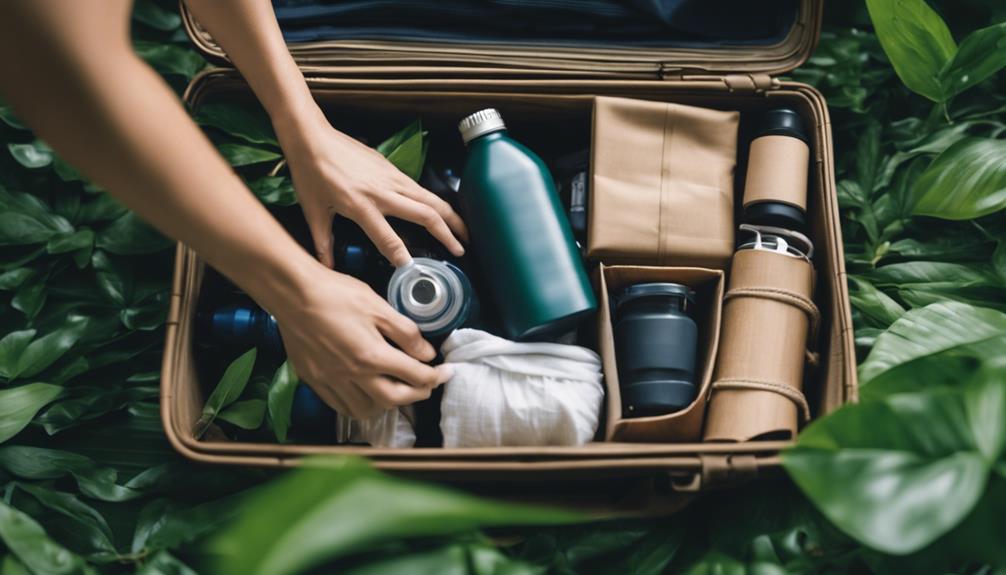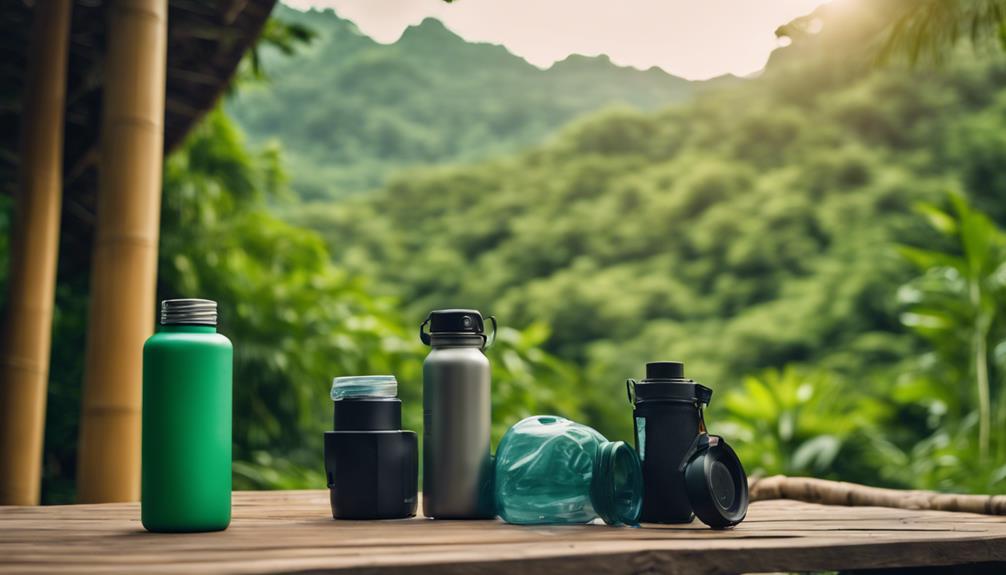When packing for eco-friendly travel, start by selecting a sustainable backpack made from recycled materials. Aim for lighter luggage, adopting minimalist packing techniques and versatile wardrobes to reduce fuel consumption on flights. Switch to biodegradable toiletries and prioritize products with organic ingredients for minimal environmental impact. Don't forget a reusable water bottle and opt for clothing made from eco-friendly fabrics. Include must-have sustainable essentials like water filter bottles and solar-powered gadgets. Embrace the use of multipurpose items and ethical travel accessories. Exploring further will provide you with valuable tips to refine your packing strategy.
Key Takeaways
- Opt for durable backpacks made from recycled materials and prioritize brands with ethical production practices.
- Pack light with versatile clothing and lightweight luggage to reduce fuel consumption during travel.
- Choose biodegradable toiletries and reusable containers to minimize plastic waste.
- Support sustainable agriculture by selecting toiletries with organic ingredients and eco-friendly clothing.
- Embrace reusable items like bottles and bags, and consider solar-powered travel gadgets for a lower environmental impact.
Choosing a Sustainable Backpack
When selecting a sustainable backpack for your travels, consider options made from recycled materials like plastic bottles, as these greatly reduce environmental impact. This decision allows you not only to meet your travel needs but also to contribute actively to preserving our planet. Brands such as Patagonia and Osprey Europe have led the way in the production of such backpacks, prioritizing ethical production practices that use sustainable materials.
Moreover, opting for a durable backpack made from long-lasting materials minimizes the need for frequent replacements, helping to reduce waste. This is a smart and responsible way to travel, showing your dedication to eco-friendly practices.
Beyond sustainability, your backpack should also provide comfort and functionality. Features such as padded straps and multiple compartments for organization can significantly enhance your travel experience. It's not just about being eco-conscious; it's about belonging to a community of travelers who are mindful of their impact on the environment.
Lastly, remember to choose a backpack size that fits your travel needs. Overpacking not only strains your back but also the environment. By making these conscious choices, you're journeying towards sustainable travel, one backpack at a time.
The Lighter, The Better
When preparing for your journey, consider this – the lighter your luggage, the less fuel planes need to burn, leading to reduced greenhouse gas emissions. Your choice of a minimalist, versatile wardrobe can contribute greatly to packing light.
Also, adopting smart packing techniques, such as rolling clothes and opting for durable, lightweight luggage made from sustainable materials, can further amplify your eco-friendly travel efforts.
Minimizing Luggage Weight
Lightening your luggage, by selecting versatile clothing items and compact eco-friendly toiletries, not only eases your travel experience but also substantially reduces fossil fuel consumption by decreasing airplane weight. This is a key step in eco-friendly travel and a great way to reduce your carbon footprint.
To ensure you're packing light, consider these four strategies:
- Pack versatile clothing: Opt for lightweight, wrinkle-resistant clothing that can be mixed and matched to create various outfits.
- Choose compact toiletries: Select eco-friendly toiletries that come in small, reusable containers to reduce waste and weight.
- Limit gadgets: Only bring the electronic devices you absolutely need. Each gadget adds to the overall weight of your luggage.
- Use lightweight luggage: Opt for luggage made from lightweight materials. Every kilogram saved can result in fuel savings of up to 3-5% on flights.
Smart Packing Techniques
Moreover, implementing strategic techniques like rolling your clothes instead of folding, and opting for sustainable, lightweight materials can greatly reduce the weight of your luggage and your carbon footprint. By doing so, you'll not only save space in your suitcase but also contribute to reducing fossil fuel consumption by airplanes. This simple packing act can have a profound effect on your personal carbon footprint.
Choosing versatile clothing items that can be mixed and matched also helps you pack fewer clothes. This strategy cuts down on unnecessary weight and reduces the need to purchase new items at your destination.
Moreover, sustainable packing practices such as using packing cubes or compression bags can maximize space and minimize waste. Such practices aren't only efficient but also align with eco-friendly values.
Opting for Eco-Friendly Toiletries
When you're packing for your next trip, consider your toiletry selection as an important part of eco-friendly travel. By choosing biodegradable products, you can greatly reduce plastic waste, which adds up to substantial amounts annually.
Additionally, reusable toiletry containers and products with organic ingredients not only lessen your environmental impact, but also contribute to a healthier travel experience.
Selecting Biodegradable Products
You can greatly lessen your environmental impact by selecting biodegradable toiletries for your travel needs, such as solid shampoo bars and body wash bars, which not only cut down on plastic waste in landfills but also promote sustainable travel practices. By replacing traditional toiletries packed in single-use plastic containers with biodegradable products, you're making a conscious effort to reduce your carbon footprint and support eco-friendly travel practices.
Solid Shampoo and Body Wash Bars: These are compact, easy to travel with, and entirely plastic-free. They last longer than liquid products and are made from natural ingredients, reducing chemical runoff.
Toothpaste Tabs: Unlike regular toothpaste that comes in a plastic tube, these are packed in a recyclable tin. Made from natural ingredients, they help reduce plastic waste and minimize chemical contamination in water sources.
Biodegradable Sunscreen: This protects you from harmful UV rays while taking care of marine life. Conventional sunscreens have chemicals that are harmful to corals and marine species.
Bamboo Toothbrushes: A sustainable alternative to plastic toothbrushes, their biodegradability reduces the amount of plastic waste.
Reusable Toiletry Containers
By ditching single-use travel-sized products in favor of reusable toiletry containers, you're not only reducing plastic waste but also opting for a more sustainable and eco-friendly travel lifestyle. These containers, made from materials such as silicone, aluminum, or glass, are not only durable but also can be used repeatedly, leading to less waste.
Choosing eco-friendly toiletries in refillable containers can notably cut down on packaging waste during your travels. Whether it's your favorite shampoo, conditioner, or lotion, these reusable containers offer you the convenience of taking your preferred products on the go while promoting a zero-waste lifestyle.
Moreover, you'll find that over time these containers will save you money. Investing in reusable toiletry containers means you're buying less plastic and spending less on travel-sized products that run out quickly.
To illustrate, here's a quick comparison:
| Single-Use Toiletries | Reusable Toiletry Containers |
|---|---|
| High plastic waste | Reduces plastic waste |
| More expensive in the long run | Cost-effective over time |
| Limited product choices | Use your preferred eco-friendly toiletries |
Organic Ingredients Importance
Exploring toiletries laden with organic ingredients isn't only a step towards healthier personal care but also a significant move in reducing the influx of harmful chemicals into our water systems. As part of your eco-friendly travel journey, opting for these toiletries supports sustainable agriculture practices and reduces your overall environmental impact.
Let's investigate why organic ingredients make a difference:
- Reduced Chemical Runoff: Organic ingredients are grown without synthetic pesticides or fertilizers, reducing the risk of these harmful substances entering our water systems.
- Support for Sustainable Agriculture: By choosing products with organic ingredients, you're supporting farmers who use sustainable practices, promoting healthier ecosystems.
- Biodegradability: Eco-friendly toiletries loaded with organic ingredients are often biodegradable. This reduces pollution in our water sources, contributing to cleaner oceans and rivers.
- Ethical Production: Brands that prioritize organic ingredients usually adhere to ethical and sustainable production processes, enabling you to support companies that share your values.
Importance of Reusable Bottles
In the pursuit of sustainable travel, the importance of reusable bottles cannot be emphasized enough, as these eco-friendly alternatives can save up to 156 plastic bottles per person annually. As you endeavor to reduce your impact, remember that plastic bottles take an astounding 450 years to decompose. By making the switch, you're not only reducing carbon emissions caused by the production and transportation of single-use bottles, but also combating the plastic waste inundating our landfills and oceans.
Consider the options available for reusable bottles. Stainless steel and glass are two eco-friendly materials that offer longevity and are easy to clean.
To help visualize the impact, consider this:
| Reusable Bottles | Plastic Bottles | Result |
|---|---|---|
| 1 person's average annual use | 156 single-use bottles | Significant reduction in waste |
| Decomposition time | 450 years for plastic | Immediate environment benefit |
| Material options | Stainless steel, glass | Eco-friendly, durable |
| Carbon emissions | Reduced with reusables | Higher with single-use |
| Impact on landfills and oceans | Reduced waste with reusables | Increased with single-use |
Sustainable Clothing Choices
Your clothing choices can have a substantial impact on your travel's eco-footprint. Opting for eco-friendly fabrics, adopting a minimalist packing approach, and buying second-hand are strategies you can use to make sustainable choices.
Let's explore these concepts further, and how they can contribute to a more environmentally-friendly travel experience.
Choosing Eco-Friendly Fabrics
When it comes to packing for your trip, selecting clothes made from organic cotton, bamboo, or Tencel can greatly reduce your environmental footprint. These are the fabrics you should be focusing on for sustainable travel packing.
Organic cotton is a significant choice because it uses less water and pesticides compared to conventional cotton production. Not only is this better for the environment, but it also creates softer, more comfortable clothing ideal for travel.
Bamboo fabric, on the other hand, is naturally antibacterial and moisture-wicking. This makes it the perfect option for those long travel days when you need your clothes to stay fresh and dry.
Tencel fabric, produced from sustainably sourced wood pulp, offers a soft and breathable option for eco-conscious travelers. It's a wonderful choice for both comfort and sustainability.
Now, let's breakdown these choices:
- Organic cotton: Uses less water and pesticides, softer and comfortable for travel.
- Bamboo: Naturally antibacterial and moisture-wicking, stays fresh and dry.
- Tencel: Made from sustainably sourced wood pulp, soft and breathable.
- All: Biodegradable, reducing impact on landfills and environment.
Choosing these eco-friendly fabrics not only benefits your travel experience but also contributes to a more sustainable world.
Minimalist Packing Approach
When pondering over your environmental impact and aiming to pack light, opt for a minimalist packing approach by selecting versatile clothing items that can be easily mixed and matched. This strategy isn't only better for the planet, but it also simplifies your travel experience.
The key is to create a capsule wardrobe — a concise collection of clothing that works in harmony. This entails choosing pieces that are interchangeable and suitable for multiple scenarios. A capsule wardrobe reduces overpacking and the need for excess baggage, making your journey smoother and more sustainable.
Choose sustainable fabrics like organic cotton, bamboo, or Tencel whenever you can. These materials aren't only eco-friendly but also lightweight and moisture-wicking, providing comfort and ease of care during your travels.
Keep in mind the cultural norms of your destination when selecting your travel attire. This demonstrates respect for local customs and helps you blend in, fostering a sense of belonging.
The minimalist packing approach isn't just a trend, it's a lifestyle choice that positively impacts the environment. It's about making conscious decisions that benefit both you and the planet. So, next time you travel, remember less is more. Your choices matter.
Buying Second-Hand Clothes
Diving into the world of second-hand clothing can drastically curtail your carbon footprint, making a significant impact on the fight against fast fashion and its environmental drawbacks. When you buy second-hand clothes, you're not only reducing textile waste but also supporting a circular economy. Here's how:
- Reducing Demand for New Clothing: Each second-hand item purchased means one less new item produced, reducing the energy and resources consumed in manufacturing.
- Extending Lifespan of Garments: By reusing clothes, you're extending their life, thereby minimizing the environmental impact of fast fashion.
- Saving Water and Energy: Textile production is resource-intensive. Buying second-hand saves the water and energy that would've been used to produce new clothing.
- Supporting a Circular Economy: Buying second-hand promotes a circular economy, where goods are reused, reducing the overall carbon emissions from clothing manufacturing.
Investing in second-hand clothes isn't just economically savvy—it's a unique way of expressing your individual style while contributing to a more sustainable future. Embrace the charm and history of pre-loved clothes, and find pride in making ethical, eco-friendly fashion choices.
Benefits of Reusable Bags
As you consider the significant role reusable bags play in reducing the alarming number of over 1 trillion plastic bags used each year worldwide, it's important to understand their many benefits. The use of reusable bags, a simple act, can greatly reduce the reliance on single-use plastic, thereby conserving resources and reducing pollution. Research shows that a single reusable bag can replace over 700 disposable plastic bags.
By using reusable bags, you're not just reducing waste; you're actively preventing marine plastic pollution. This is essential, as plastic pollution threatens marine life and our ecosystems. Many countries are recognizing this issue, implementing bans or fees on single-use plastic bags.
Reusable bags don't just offer environmental benefits; they're also durable and versatile, perfect for shopping, travel, and everyday use.
You can be part of this change, by embracing reusable bags, you're aligning with a global community committed to sustainable living.
Must-Have Sustainable Travel Essentials
When planning your next adventure, incorporating sustainable travel essentials such as a water filter bottle, reef-safe sunscreen, and eco-friendly gear into your packing list not only reduces your environmental footprint, but also contributes to a healthier planet.
Including items like the LifeStraw Go, which eliminates 99.9999% of waterborne bacteria, diminishes plastic waste in oceans. Your choice of sunscreen also matters. Opt for reef-safe options, like the organic variety from Green People, to protect coral reefs from harmful chemicals.
Here are four must-haves for your sustainable travel kit:
- Water bottles: A filter bottle like LifeStraw Go is perfect for safe, plastic-free hydration.
- Zero waste essentials: Bamboo utensils, stainless steel straws, and takeaway food tins can notably cut down single-use plastic waste.
- Eco-friendly gear: Consider brands like Osprey Europe for vegan, recycled bags.
- Period pants: A sustainable and convenient alternative to single-use menstrual products, perfect for travel.
Moreover, consider zero-waste toiletries and reusable containers like GoToobs for a plastic-free alternative. Adopting these sustainable practices shows your commitment towards a healthier planet.
Solar-Powered Gadgets for Travel
Continuing with the theme of sustainability, let's explore the benefits of solar-powered gadgets for travel, another step you can take to reduce your environmental impact. These innovative devices, ranging from chargers to flashlights, not only offer convenience but also notably reduce electricity consumption.
Think about it: each time you use a solar-powered charger, you're decreasing reliance on traditional power sources, which often involve the burning of fossil fuels. This reduction in energy demand directly contributes to shrinking your carbon footprint. And let's not overlook the decrease in battery waste, another substantial plus for our environment.
Now, let's understand the practicality of these solar-powered gadgets. They're not just beneficial for our planet; they're also incredibly convenient for you. Imagine never having to worry about finding a power outlet while exploring the great outdoors or during long-haul flights. Your devices stay powered up, and you stay connected, all through the power of the sun.
In the grand scheme of your sustainable travel practices, opting for solar-powered gadgets might seem like a small step. But remember, each small action contributes to a noteworthy collective impact. Together, we can make a difference.
Ethical Travel Accessories
Switching over to ethical travel accessories, you'll find that bamboo products, like sunglasses, earphones, and toothbrushes, offer a sustainable alternative, not only due to bamboo's rapid growth and high CO2 absorption but also because of its natural antibacterial properties. Bamboo's resilience makes it a perfect material for travel accessories, reducing your carbon footprint whilst ensuring quality and durability.
- Bamboo Sunglasses: Sustainable travel accessories start with what you wear. Opt for bamboo sunglasses, which aren't just eco-friendly but also lightweight and stylish.
- Bamboo Earphones: Brands like House of Marley offer bamboo earphones, combining quality sound with sustainability.
- Bamboo Toothbrushes: Swap your plastic toothbrush for a bamboo one. It's a small change that makes a big difference in reducing landfill waste.
- Shampoo Bars: Ditch the plastic bottles and switch to shampoo bars. They're compact, easy to travel with, and come in minimal packaging.
Lastly, consider packing your ethical travel accessories in a sustainable suitcase, made from recycled materials. Remember, each choice you make impacts the world around you. By choosing sustainable options, you're not only taking care of yourself but also of the environment. Let's make every journey an eco-friendly one.
The Role of Multipurpose Items
Embracing the use of multipurpose items during your travels can drastically reduce waste while providing practical utility. An excellent example is microfiber towels that can absorb up to seven times their weight in water, eliminating the need for packing multiple towels.
Other versatile items such as a sarong can serve multiple purposes, acting as a beach towel, scarf, or even a makeshift bag, saving space and resources.
Similarly, packing a reusable water bottle reduces plastic waste and can also function as a hot water bottle or storage container.
Consider too, the role of a travel scarf. Multifunctional, it can be used as a blanket, pillow, or makeshift bag, providing practicality and minimizing the need for extra items.
Another versatile item worth attention is a spork. This clever utensil eliminates the need for single-use ones, serving multiple purposes during your journey.
Frequently Asked Questions
How to Pack Sustainably for Travel?
Embrace minimalist packing: choose durable, multipurpose clothes, and pack them in recycled luggage. Opt for reusable containers and zero-waste toiletries like solid shampoo bars. You're not just traveling, you're caring for the planet.
What Is the Most Sustainable Way to Travel?
You'll find the most sustainable travel methods are trains, buses, and cycling, reducing emissions by up to 90%. Carpooling, carbon offsetting, and choosing green accommodations also contribute to an eco-friendly journey.
How Can I Make Travel Packing Easier?
To make packing easier, adopt minimalist packing strategies. Use capsule wardrobes and versatile clothes. Try travel hacks like rolling clothes and using packing cubes. A digital luggage scale prevents overpacking. You'll belong to savvy travelers' league!
What Is Sustainable Travelling?
Sustainable travelling's about minimizing your environmental impact. It's embracing green tourism, opting for eco accommodations, practicing carbon offsetting. You're not just visiting places, you're preserving them for future generations.
Conclusion
As the saying goes, every little bit helps. Your choices can make a significant impact on our planet. By choosing a sustainable backpack, light packing, eco-friendly toiletries, reusable bottles, sustainable clothing, and ethical accessories, you're not just traveling, you're making a statement.
Utilizing multipurpose items and solar-powered gadgets further reduces your carbon footprint. Remember, the ball's in your court. Make your next trip a green journey. Because, after all, there's no Planet B.














